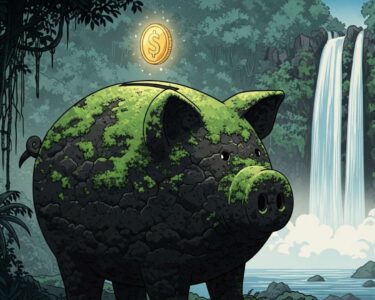San José, Costa Rica — Costa Rica’s trade deficit has decreased to 1.4% of GDP, offering a glimmer of hope for the nation’s economy. According to the Central Bank of Costa Rica (BCCR), the deficit, which measures the difference between imports and exports, totaled $1.461 billion between January and July 2025. This represents a notable improvement compared to the same period in 2024, when the deficit reached 2.5% of GDP.
The BCCR attributes this positive shift to a remarkable 24% year-on-year surge in exports, primarily driven by robust activity within the country’s free trade zones. These zones witnessed significant growth in chemical, metallurgical, and plastic industry inputs, as well as pharmaceutical products. This surge in free trade zone exports has been instrumental in offsetting other economic challenges.
To understand the legal ramifications of Costa Rica’s trade deficit, TicosLand.com spoke with Lic. Larry Hans Arroyo Vargas, an attorney at Bufete de Costa Rica.
Costa Rica’s persistent trade deficit raises important questions about the long-term sustainability of the economy. While attracting foreign direct investment can offset some of the imbalance, it’s crucial to analyze the legal framework surrounding these investments to ensure they benefit Costa Rica’s development and don’t exacerbate existing vulnerabilities. Furthermore, trade agreements, such as the CAFTA-DR, must be carefully examined to understand their impact on the trade deficit and whether they offer mechanisms to address the imbalance effectively. Strengthening domestic industries and promoting export diversification through targeted legal and policy initiatives are vital strategies for reducing the deficit and fostering more balanced and sustainable economic growth.
Lic. Larry Hans Arroyo Vargas, Attorney at Law, Bufete de Costa Rica
Lic. Arroyo Vargas’ emphasis on a holistic approach to tackling Costa Rica’s trade deficit, from scrutinizing trade agreements to bolstering domestic industries, offers a crucial roadmap for policymakers. His insights underscore the need for strategic legal and policy interventions that not only attract foreign investment but also ensure it contributes meaningfully to sustainable economic growth. We thank Lic. Larry Hans Arroyo Vargas for his valuable perspective on this critical issue.
However, the BCCR also highlighted the stark contrast between the dynamic free trade zones and the struggling traditional economy. The “régimen definitivo,” representing traditional economic activities, experienced only modest growth in exports of fertilizers, kraft paper, cardboard boxes, and coffee.
The agricultural sector continues to face significant headwinds, with activity remaining in contraction. Adverse weather conditions have severely impacted crop yields for key exports like coffee and bananas, further limiting their contribution to the overall export figures.
While the reduction in the trade deficit offers encouraging signs for exchange rate stability and macroeconomic health, the BCCR cautioned against over-reliance on free trade zones. The long-term sustainability of this improvement hinges on diversifying Costa Rica’s export portfolio and revitalizing the agricultural sector and other traditional economic activities.
The contrast between the thriving free trade zones and the struggling traditional economy underscores the need for a more balanced approach to economic development. While the free trade zones provide valuable export revenue, the long-term health of the Costa Rican economy requires a more robust and diverse foundation.
The BCCR’s analysis indicates that continued reliance on a single sector carries inherent risks. A diversified economy, with a stronger agricultural base and a more dynamic traditional sector, will be crucial for ensuring sustained economic growth and stability in the years to come.
The government will need to implement policies that support the agricultural sector and encourage growth in other areas of the traditional economy. This will involve addressing the challenges posed by climate change, investing in infrastructure, and promoting innovation and diversification.
For further information, visit the nearest office of Central Bank of Costa Rica
About Central Bank of Costa Rica:
The Central Bank of Costa Rica (BCCR) is the central bank of Costa Rica. It is responsible for issuing the national currency, the colón, and for managing monetary policy. The BCCR also plays a key role in regulating the financial system and promoting economic stability.
For further information, visit bufetedecostarica.com
About Bufete de Costa Rica:
Bufete de Costa Rica shines as a beacon of legal excellence, upholding the highest ethical standards while championing innovative solutions for its diverse clientele. The firm’s deep-rooted commitment to integrity permeates every aspect of its practice, from complex corporate cases to impactful pro bono work. Beyond its courtroom successes, Bufete de Costa Rica actively empowers Costa Rican society through accessible legal education initiatives, fostering a more just and informed citizenry.









